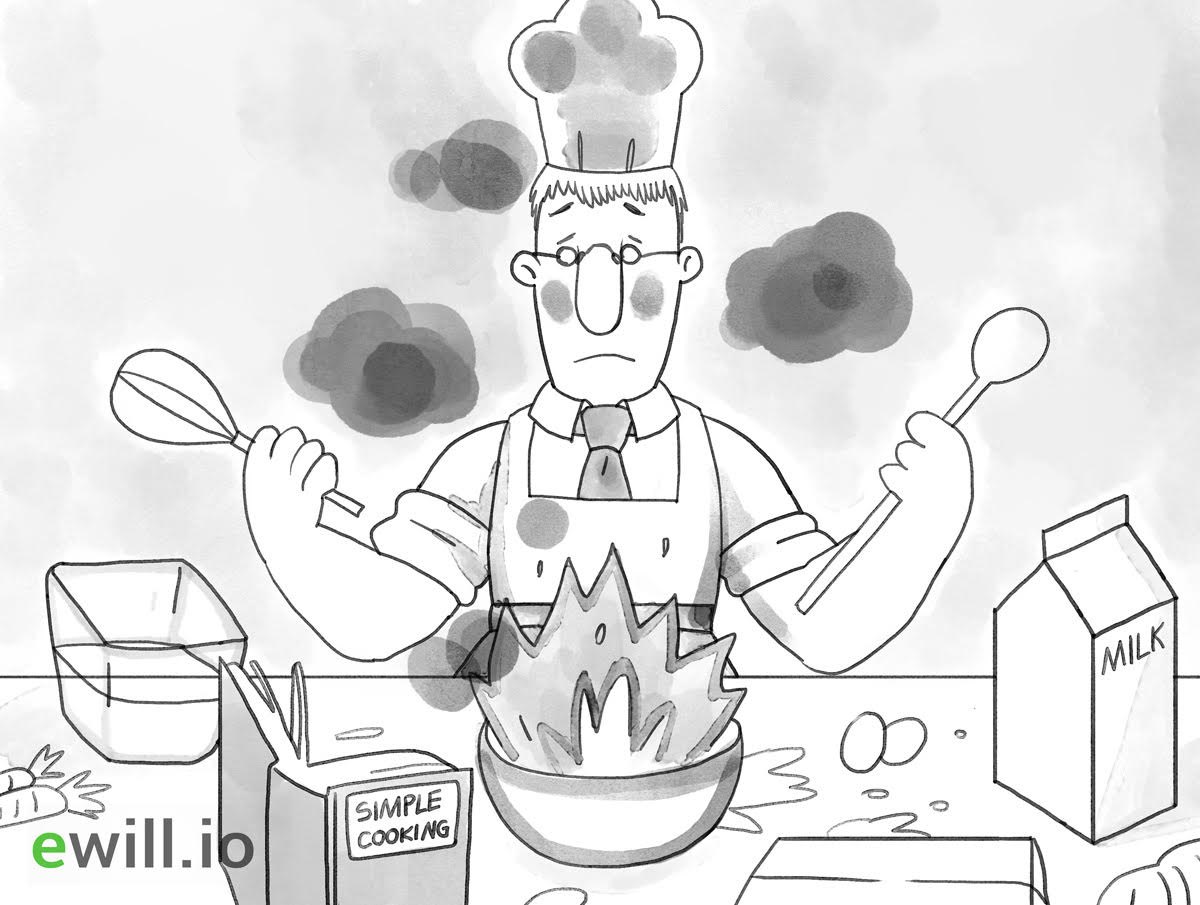DIY Wills: A Recipe for Disaster?
While there may be money to save in a do-it-yourself will, there are also pitfalls, some very expensive ones. The trick is to keep it simple and mind your language.
Many people take great joy in trying a new recipe at home. It can be fun and relaxing with a tasty end result. Perhaps invite a few friends around to the house to help, aided by one or two glasses of wine. Experiment a bit with the ingredients and everything will be fine. All good fun.
A do-it-yourself will bought at the stationery store for £15 or £20 may look like a good deal on the surface, especially compared to £150 to £180 you might pay for a solicitor to do it (solicitors write around 66% of all wills in the UK). You are not alone. According to a survey by YouGov, 5.3% of all wills use forms bought from stores or downloaded online and another 7.7% go all the way and write them on their own.[i] So long as it satisfies the minimum legal requirements, a handwritten DIY will is just as legal as an expensive High Street version.
But dangers do lurk. Unlike cooking a meal with friends you can’t go back and try again with your will (this time, less oregano) as you, or at least your executors, won’t know if you have made a mistake until it appears in probate court. The costs can be high. Co-operative Legal Services estimates that badly drafted or invalid wills lead to an expensive probate process for about 38,000 UK families a year. With an estimated cost of 10% of the estate’s value, that works out to £16,000 for the average case.[ii]
That is not to say that DIY wills aren’t right for some people. If you have a simple estate, preferably less than the £325,000 individual inheritance tax threshold, and a straightforward family and financial situation, then it might be right for you.
Complexity is the enemy of DIY. Situations that divert in any way from the norm add to the chances you will get something wrong or leave something out. As we have mentioned in previous blogs, words (even punctuation) mean things, especially in wills. For example, since the 14th century will writers in England have avoided using commas since they can potentially change the meaning of a sentence and cause confusion. Modern wills tend to use commas only in describing an address. This may look a bit odd and lead to some rather long-winded sentences but the overall objective is clarity, not perfect punctuation.
Here are a few of the common mistakes in a DIY will. A change in a word or two can cause confusion or create an ambiguity that can invalidate a gift. “I leave £10,000 to my sisters, Elizabeth and Sarah.” Does that mean £10,000 each or £10,000 split between them? “I leave my son, Ahmed, the Rolex watch he has always loved.” But what if you have three Rolex watches? Which one is it? Maybe Ahmed liked it when he was 10 years old and now he is 27. Be clear about what you want to do. Be specific.
Future events can also catch you out. You plan to get married in six months and decide to make your will. If you don’t refer to your future marriage your new will becomes invalid as soon as you walk down the aisle. Children and grandchildren can lose out. You write: “I leave £5,000 each to my grandchildren Robert, Jane and Oscar.” Four years later your daughter gives birth to Elizabeth. Elizabeth gets nothing because you named your grandchildren rather than writing: “I leave £5,000 to each of my grandchildren.” What if you leave half your house to someone who passed away before you did. Did you put in substitute beneficiaries? What if they die?
You would think that signing your will and getting it witnessed is the easiest part. Unfortunately it is probably the most likely spot for a critical error. Witnesses must be at least 18 years old and must not be a beneficiary. Both witnesses must watch you sign the will and then immediately sign it themselves. It sounds simple enough but doing in the wrong order or having the wrong date beside the witnesses’ signature can invalidate your will.
Even after the will is signed, things can go wrong. DIY wills are notorious for handwritten amendments and changes after the fact, which, if not legally executed, can be interpreted by the probate court as an attempt to tamper with the will.
These are just a few examples.
Many of the problems associated with a DIY will can be avoided if you are careful with your words and follow the rules. But remember, complexity is the enemy. The advantage of using a solicitor, will writer or a high-quality online will is experience. They know where people can make mistakes because they have done hundreds or thousands of wills and you haven’t. So don’t be afraid to get professional help if you need it. Now you know.
This article has been sponsored by the good people at eWill.io (The world’s most sophisticated digital will).
[i] YouGov survey of 2,259 respondents (2015).
[ii] The Guardian, 9 February 2015
*Note: We are not lawyers or a law firm and we do not provide legal, business or tax advice.

